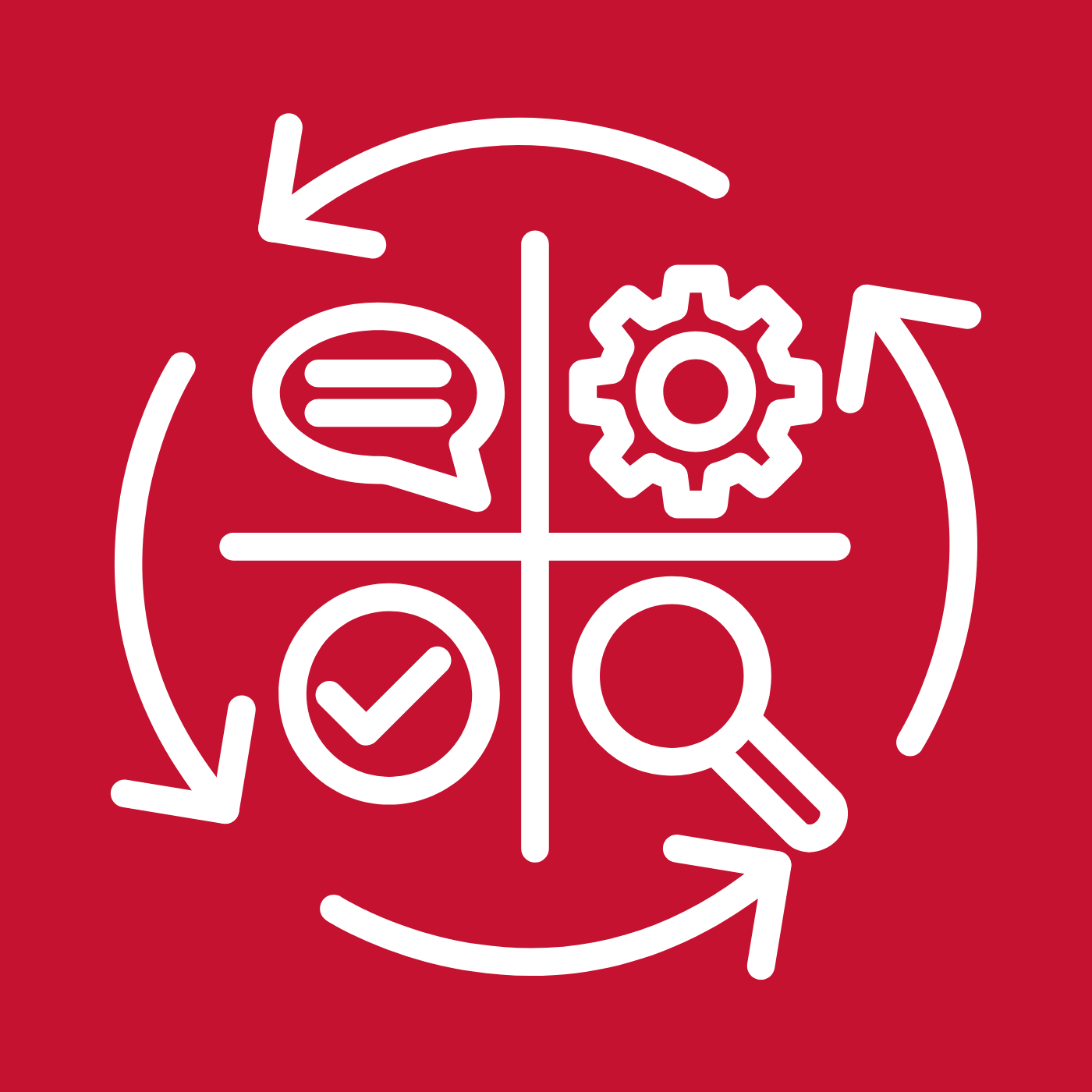Apply to Advance your Expertise
Generative AI is revolutionizing the world’s technical capabilities and it will inevitably impact the way all organizations operate. Carnegie Mellon’s new online Graduate Certificate in Generative AI and Large Language Models will help you strengthen your skill set to capitalize on this technical revolution. When you complete the online certificate, you will be ready to pioneer new systems with the latest and most advanced expertise in Generative AI.
Is this the right program for you?
Let’s face it, pursuing any kind of advanced training is an investment of your time, energy and resources. Before you begin your application, take a moment to review the program requirements below.
Successful applicants will have:
- A bachelor’s degree in computer science or a related field
To successfully complete the coursework in this program, applicants should have an undergraduate degree in computer science, machine learning, data science, software engineering or a related field. - Proficiency in applied mathematics and statistics
Students should have successfully completed coursework in applied mathematics (such as calculus and linear algebra) and statistics. - Proficiency in Python
Students should have a foundation in algorithms and data structures and be proficient in Python. If students do not have formal training in Python, knowledge gained through self-study or work experience will be considered if the student can provide evidence of proficiency. - Proficiency in machine learning and deep learning concepts
Students should have familiarity with machine learning and deep learning. If students do not have formal training in these topics, knowledge gained through self-study or work experience will be considered if the students can provide evidence of proficiency. - A passion for learning and innovation
The coursework in this program provides in-depth explorations of complicated topics related to machine learning and large language models. To master these concepts, students will need a hunger to learn and an unwavering drive to build imaginative solutions for their organization.
If you have questions about the program or how it aligns with your background, please call 412-501-2686 or send an email to apply@online.cmu.edu with your inquiries.
Application Requirements
Ready to apply? Here’s what you’ll need to complete the admissions process:
✔ Complete the online application
Submit your application in the application portal.
✔ Submit your resume/CV
We’d like to learn more about your employment history, academic background, technical skills and professional achievements. Submit a 1 to 2 page resume or CV showcasing your experience.
✔ Submit your transcripts
Submit an unofficial copy of your transcript for each school you attended. Transcripts must include your name, the name of the college or university, the degree awarded (along with the conferral date), as well as the grade earned for each course. Email your transcripts directly to apply@online.cmu.edu. Please note: former Carnegie Mellon students and/or alumni can request a copy of their CMU transcript from The Hub.
✔ Upload a statement of purpose
Tell us your professional story. Where have you been and where do you hope to go? In 500 words or less, explain your objective for applying to this program and what you hope to gain from completing the coursework.
✔ Submit your TOEFL, IELTS, or DuoLingo test scores (if applicable)
An official TOEFL, IELTS, or DuoLingo test is required for non-native English speakers. This requirement will be waived, however, for applicants who either completed an in-residence bachelor’s, master’s, or doctoral degree program in the United Kingdom, United States, or Canada (excluding Quebec) or have at least three years of professional work experience using English as their primary language. If you fall into one of these categories, please include this information on your resume.
Tuition: Invest in Your Future
By enrolling in our graduate-level program, you'll be investing in your professional growth to prepare for the next wave of Generative AI solutions. We know this is a significant investment. Not just for you, but for your family as well.
So, what is the investment per course?
Below is a breakdown of our tuition for the 2025/2026 academic year:
|
Course |
Units |
Investment |
Fees |
|
Large Language Models: Methods and Applications |
12 units |
$8,484 |
$240 technology fee |
|
Multimodal Machine Learning |
12 units |
$8,484 |
$240 technology fee |
|
Large Language Model Systems |
12 units |
$8,484 |
$240 technology fee |
|
Total Investment |
$25,452 |
|
|
Carnegie Mellon alumni are eligible for a scholarship to the Graduate Certificate in Generative AI & Large Language Models worth up to 20% of tuition. Indicate your alumni status within the application to be eligible.
Out-of-Pocket Expenses
- Large Language Models: Methods and Applications - in order to complete homeworks and activities, students will need to sign up for Amazon Web Services (AWS) or an equivalent service that offers access to A10g or similar GPUs. The AWS cost to complete assignments will range from $150-300 and will vary based on your usage. In addition, students will need to sign up for the OpenAI API. The cost to complete the assignments via OpenAI will be up to $25. Instructions for accessing both services will be provided when the class begins.
- Multimodal Machine Learning and Large Language Model Systems - AWS and/or OpenAI or other services may be required for these courses with fees up to $300 per course. More details will be available as you get closer to the course start date.
Technology Fee
- A technology fee of approximately $240 will be assessed each semester (subject to change).
The rates above are for the 2025/2026 academic year only.
- If the program is not completed within that time frame, tuition may increase slightly for the following academic year.
Financing Your CMU Graduate Certificate
Monthly Payment Plan
CMU provides a monthly payment option, managed by Nelnet Campus Commerce, designed to help students spread out tuition payments into manageable monthly installments. This plan also offers the ease of online enrollment. Should you be admitted and choose to join us, we recommend registering for this plan early to fully benefit from the range of payment options available.
Financial Aid & Private Loans
Students pursuing a graduate certificate are not eligible to receive federal financial aid. However, private loans are a viable alternative to consider with competitive interest rates and borrower benefits. See FastChoice, a free loan comparison service to easily research options.
Employer Tuition Reimbursement
Many companies offer tuition reimbursement programs to foster professional development among their employees. We encourage you to contact your HR department to find out if similar opportunities exist at your workplace.
When you speak to your employer, you can share that our program:
- Consists of three transcripted, credit-bearing courses (not just continuing education units) taught by expert Carnegie Mellon professors from the nationally-ranked School of Computer Science.
- Teaches you the latest advances in large language model systems, machine learning, natural language processing, and system research.
- Prepares you to design and implement scalable systems for large language models and teaches you how to efficiently train them with huge data sets, which is critical for advancing AI.
- Trains you to determine the best model for a given task by evaluating the pros and cons of different models.
- Empowers you to solve sophisticated engineering problems with modern hardware and software stacks that can accommodate the scale of large language models.
- Is delivered completely online, which means you can take classes on your own time while maintaining your normal work schedule.
Not sure how to approach your employer? Need specific documents to proceed with enrollment? Call 412-501-2686 or send an email to apply@online.cmu.edu with your inquiries. If you’re ready to build new solutions with Generative AI, we’re here to help you make that a reality.
CMU EMPLOYEE TUITION REIMBURSEMENT
The Graduate Certificate in Generative AI & Large Language Models is eligible for CMU tuition remission. Review the CMU tuition remission policy to check your eligibility.
GI Bill Funding
Carnegie Mellon University provides services to veterans and their dependents who are eligible for Veterans Education Benefits under the Montgomery G.I. Bill®, Post-9/11 G.I. Bill, and Vocational Rehabilitation and Employment Program. Please note, our online graduate certificates are not currently eligible for the Yellow Ribbon program.
The process starts with an application directly to Veterans Affairs and once approved, you will provide your Certificate of Eligibility to the Carnegie Mellon Veterans Affairs Coordinator. Contact Information and additional details about the process can be found here.
A Note for International Applicants
As part of a global university with locations and students from around the world, the School of Computer Science welcomes the diverse perspectives that international students bring to our programs.
To help ensure you are fully prepared for the admissions process and, if admitted, for success as a student, this section provides detailed information about requirements for international applicants.
The Graduate Certificate in Generative AI & Large Language Models considers for admission international applicants who reside within, or outside of, the domestic United States. International applicants who reside within or outside of the domestic United States are advised of the following information and additional requirements for international applicants to the program.
Student Visas
Since this program is fully online, enrollment in this program will not qualify students for any type of visa to enter or remain in the United States for any purpose.
U.S. Sanctions; U.S. Sanctioned Countries
Individuals who are the target of U.S. sanctions or who are ordinarily resident in a U.S. sanctioned country or who live or expect to live in a U.S. sanctioned country while participating in the program are not eligible for admission to this program due to legal restrictions/prohibitions and should not apply. U.S sanctioned countries are currently Cuba, Iran, North Korea, Russia, Syria and the following regions of Ukraine: Crimea, Donetsk and Luhansk. In addition, all or a portion of this program may not be available to individuals who are ordinarily resident of certain countries due to legal restrictions.
Applications received from these individuals will not be accepted. As well, if an individual is admitted to the program and subsequently, the individual becomes the target of U.S. sanctions, ordinarily resident of a U.S. sanctioned country or lives in a U.S. sanctioned country while participating in the program (or otherwise becomes ordinarily resident of country in which the program is not available due to legal restrictions), the individual’s continued enrollment in the program may be terminated and/or restricted (due to U.S. legal restrictions/ prohibitions) and the individual may not be able to complete the program.
Time and Attendance Requirement
Classes for the program will be taught in the U.S. Eastern Time Zone, and students must be available to attend all live classes, regardless of location.
Licensure in Various Jurisdictions
From time to time Carnegie Mellon reviews the licensing requirements of various jurisdictions in order to assess whether Carnegie Mellon may be precluded from making the program available to applicants that are residents of one or more of these jurisdictions prior to Carnegie Mellon obtaining the relevant license(s). Affected applicants from these jurisdictions, if any, will be notified prior to enrollment if the Carnegie Mellon determines that it is unable to make the program available to them for this reason.
Value Added Tax (VAT) and Other Taxes
The tuition, required fees and other amounts quoted for this program do not include charges for applicable Taxes (hereinafter defined). The student is responsible for payment of all applicable Taxes (if any) relating to the tuition, required fees and other amounts required to be paid to Carnegie Mellon for the program, including any Taxes payable as a result of the student’s payment of such Taxes.
Further, the student must timely make all payments due to Carnegie Mellon without deduction for Taxes, unless the deduction is required by law. If the student is required under applicable law to withhold Taxes from any payment due to Carnegie Mellon, the student is responsible for timely (i) paying to Carnegie Mellon such additional amounts as are necessary so that Carnegie Mellon receives the full amount that it would have received absent such withholding, and (ii) providing to Carnegie Mellon all documentation, if any, necessary to permit the student and/or Carnegie Mellon to claim the application of available tax treaty benefits (for Carnegie Mellon review and completion, if warranted and acceptable).
Taxes mean any taxes, governmental charges, duties, or similar additions or deductions of any kind, including all use, income, goods and services, value added, excise and withholding taxes assessed by or payable in the student’s country of residence and/or country of payment (but does not include any U.S. federal, state or local taxes).
So, why CMU?
We strive for excellence

We embrace iteration

We collaborate across disciplines

We pioneer new fields
